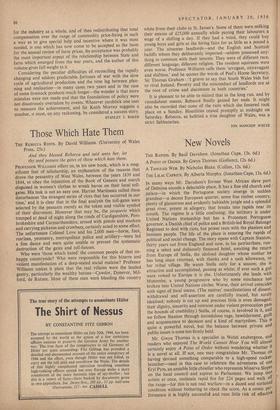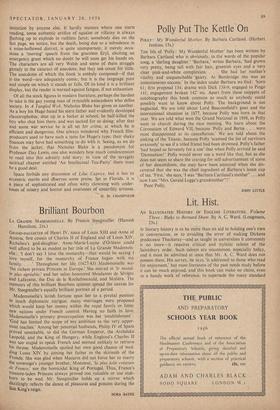New Novels
THE RAPIDS. By Basil Davidson. (Jonathan Cape, 13s. 6d.)
A POINT OF ORDER. By Gwyn Thomas. (Gollancz, 12s. 6d.) A TANGLED WEB. By Nicholas Blake. (Collins, 12s. 6d.) THE LILAC CAPRICE. By Alberta Murphy. (Jonathan Cape, 13s. 6d.)
IN many ways Mr. Davidson's former West African slave port of Delmina sounds a delectable place. It has a fine old church and palace—in which the Portuguese society emerge in sudden grandeur—a decent European quarter, some fine timber country, plenty of glamorous and evidently habitable jungle and a splendid great river, potent in allegory, that breaks into rapids near its mouth. The regime is a little confusing; the territory is under United Nations trusteeship but has a Protestant Portuguese governor, a Danish chief of police and a British-led Royal Balongo Regiment to deal with riots, but power rests with the planters and business people. The life of the place is entering the rapids of political and social change. The story opens with Captain Stanton, thirty years out from England and now, in his patriarchate, run- ning a select and dubiously financed hotel, awaiting the return from Europe of Stella, the idolised daughter whose mother he has long since returned, with thanks and a cash allowance, to her tribal village. He wants Stella only for a season; she is attractive and accomplished, passing as white; if ever such a girl were vowed to Europe it is she. Unfortunately she, lands with Musombe, a young progressive who by some mischance has broken into United Nations circles. Worse, their arrival coincides with signs of local unrest. (The natives' manifestations of dissent, withdrawal and self-assertion are carefully traced, but surely idealised; nobody is cut up and precious little is even damaged; their dignity, sincerity and restraint under violent provocation pass the bounds of credibility.) Stella, of course, is involved in it, and we follow Stanton through incredulous rage, bewilderment, guilt and acquiescence to decision and a kind of martyrdom. This is quite a powerful novel, but the balance between private and public issues is none too firmly held.
Mr. Gwyn Thomas is a specialist in Welsh exuberpce, and readers who enjoyed The World Cannot Hear You will almost certainly enjoy A Point of Order without wondering whether it is a novel at all. if not, one may congratulate Mr. Thomas on having devised something comparable to a high-speed rocket- launcher—used in this case to celebrate the adventures of one Eryl Pym, an amiable little chiseller who represents Minerva Slopes on the local council and aspires to Parliament. We jump into action at once, maintain rapid fire for 224 pages and walk off the range—for this is not real warfare—in a dazed and surfeited condition without bothering to check the score. As a comic per- formance it is highly successful and runs little risk of effective imitation by anyone else. It hardly matters where one starts reading, some authentic artifice of squalor or villainy is always lashing ,up to explode in ruthless farce; somebody dies on the last page, we notice, but the death, being due to a subsidence in a mine-hollowed district, is quite unimportant; it merely occa- sions a 'moving' speech from the graceless Eryl, eliciting an emergency grant which no doubt he will soon get his hands on. The characters are all very Welsh and some of them struggle gamely in the cataract of anecdote, but they to6 count for little. The anecdotes of which the book is entirely composed—if that is the word—are adequately comic, but it is the language pure and simple on which it stands or falls. Of its kind it is a brilliant display, but the reader is warned against fatigue, if not exhaustion ' Of all the stock figures in modern literature, perhaps the hardest to take is the gay young man of reputable antecedents who defies society. In A Tangled Web, Nicholas Blake has given us another. As a boy his Hugo hated his stern father and evidently developed claustrophobia; shut up in a locker at school; he half-killed the boy who shut him there, and was sacked for so doing; after that and some war service he is all set for crime, at which he is efficient and dangerous. One always wondered why French film- producers used to have such a taste for Hugo's type; their shaky finances may have had something to do with it. Seeing, as we do from the jacket, that Nicholas Blake is a pseudonym for Professor Day Lewis, one also wonders how much condescension to read into this adroitly told story; in view of the savagely satirical chapter entitled 'An Intellectual Tea-Party' there must be a good deal.
Space forbids any discussion of Lilac Caprice, but it has its eccentric merits and dbserves some praise. Set in Florida. it is a piece of sophisticated and often witty clowning with under- tones of misery and horror and overtones of unearthly artiness.
H. M. CHAMPNESS



































 Previous page
Previous page